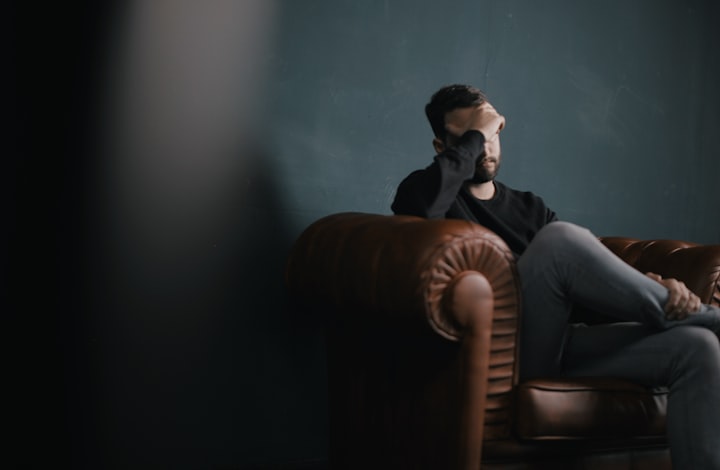"Be Fearless: Overcome Your Anxiety Now"
Anxiety, Stress and Depression

Anxiety can be a paralyzing force in our lives that is difficult to overcome. It can prevent us from doing the things we enjoy, and make it hard to accomplish our goals. However, it doesn't have to. We all have the power within ourselves to take charge of our emotions and learn how to be fearless in the face of adversity. With the right mindset and tools, anyone can learn how to cope with anxiety and become stronger.
What is Anxiety?
Anxiety is a feeling of worry, nervousness, or unease about something with an uncertain outcome. It is a normal and natural response to stressful situations, but it can interfere with daily life and functioning when it becomes excessive and persistent. Anxiety can manifest in physical symptoms such as increased heart rate, difficulty breathing, and muscle tension. It can also manifest in emotional symptoms such as difficulty concentrating, restlessness, and irritability. Anxiety can be treated with therapy, medication, and self-care techniques such as relaxation techniques and stress management.
People may experience anxiety in different ways and at varying levels of intensity - from mild butterflies in the stomach to full-blown panic attacks. When it becomes too intense or difficult to manage on your own, you may need professional help. The good news is that there are many treatments available, such as cognitive behavioral therapy (CBT) and medication, which can help reduce symptoms and improve the quality of life for those who suffer from anxiety disorders.
Causes of Anxiety.
Anxiety is a mental health disorder that affects millions of people around the world. It can cause feelings of apprehension, fear, and worry that interfere with everyday life. While anxiety can have many triggers, there are some common causes for this disorder.
One common cause of anxiety is genetics. Anxiety does tend to run in families, so if a parent or other family member has the disorder; it is more likely for other members to experience it as well. Additionally, traumatic experiences or events such as abuse or neglect can lead to feelings of anxiousness in some individuals.
Another major factor when it comes to anxiety is lifestyle habits such as not getting enough sleep, drinking too much caffeine, or alcohol and drug use. Stressful situations like work-related challenges and relationship issues may also contribute to individuals developing symptoms of anxiety in varying degrees.
Anxiety can be caused by a variety of factors, including:
- Genetics: Anxiety can be inherited from parents who have anxiety disorders.
- Brain chemistry: Anxiety can be caused by imbalances in certain chemicals in the brain, such as serotonin and norepinephrine.
- Environmental factors: Stressful life events, such as a death in the family or a major move, can trigger anxiety.
- Medical conditions: Chronic medical conditions, such as heart disease or diabetes, can cause anxiety.
- Substance abuse: Alcohol and drug abuse can cause anxiety.
- Personality: Some people are more prone to anxiety due to their personality traits, such as being perfectionistic or having an anxious temperament.
- Life circumstances: Certain life circumstances, such as living in a high-stress environment or having a high-stress job, can increase the risk of anxiety.
- Excessive caffeine intake
- Poor nutrition
- Lack of sleep
- Hormonal changes, such as during menopause or puberty
- Social isolation
- Traumatic experiences, such as abuse or violence
Symptoms of Anxiety
• Persistent worry or fear
• Difficulty concentrating
• Irritability or anger
• Difficulty falling or staying asleep
• Restlessness or edginess
• Fatigue
• Physical symptoms such as increased heart rate, sweating, and tense muscles
• Difficulty controlling anxiety or panic attacks
• Avoiding situations that may trigger anxiety
• Difficulty performing daily activities or tasks due to anxiety
• Feeling restless, wound-up, or on-edge
• Having a sense of impending danger, panic, or doom
• Having an increased heart rate
• Breathing rapidly (hyperventilation)
• Sweating
• Trembling
• Feeling weak or tired
• Trouble concentrating or thinking about anything other than the present worry
• Having trouble sleeping
• Experiencing gastrointestinal (GI) problems
• Having difficulty controlling worry
• Having the urge to avoid things that trigger anxiety
Coping Mechanisms
• Deep breathing exercises: This involves taking deep breaths in through the nose and out through the mouth, which can help calm the body and reduce anxiety symptoms.
• Progressive muscle relaxation: This involves tensing and relaxing different muscle groups in the body to help reduce muscle tension and stress.
• Mindfulness meditation: This involves focusing on the present moment and accepting thoughts and feelings without judgment, which can help reduce anxiety and improve overall well-being.
• Exercise: Physical activity can help release endorphins, which are chemicals that can improve mood and reduce anxiety.
• Seeking support from friends, family, or a therapist: Talking about and sharing feelings and concerns with someone can help alleviate anxiety.
• Coping thoughts: This involves replacing negative thoughts with more positive or realistic ones, which can help reduce anxiety.
• Creating a routine: Establishing a daily routine and structure can help reduce anxiety by providing a sense of predictability and control.
• Practicing self-care: Engaging in activities that promote physical and emotional well-being, such as taking breaks, getting enough sleep, and eating a healthy diet, can help reduce anxiety.
• Exercise and physical activity: Regular physical activity can help to reduce anxiety, improve mood, and promote better sleep.
• Deep breathing: Taking slow, deep breaths can help to reduce stress and relax the body.
• Meditation: Meditation and mindfulness activities can help to focus the mind and reduce anxious thoughts.
• Cognitive-behavioral therapy (CBT): CBT is a type of therapy that can help to identify and change negative thought patterns that may be contributing to anxiety.
• Relaxation techniques: Relaxation techniques such as progressive muscle relaxation, yoga, and tai chi can help to reduce physical tension and reduce anxious thoughts.
• Journaling: Writing down thoughts and feelings can help to identify and process anxieties.
• Talk therapy: Talking to a therapist or counselor can help to identify the source of anxiety and develop strategies for managing it.
• Aromatherapy: Aromatherapy using essential oils can help to reduce stress and promote relaxation.
• Positive self-talk: Positive self-talk can help to reframe anxious thoughts into more realistic and helpful ideas.
• Social support: Connecting with supportive friends, family, and community members can help to reduce feelings of isolation and loneliness.
Conclusion: Be Fearless
In conclusion, it is important to remember that fearlessness is essential for success. Being fearless allows you to take risks, dream big and live life to the fullest. It can help you develop resilience and a “can-do” attitude, which will make you unstoppable. As fear is often a mental barrier, it is up to each of us to proactively challenge ourselves and strive for greatness through fearlessness.
About the Creator
Zai Wisdom
Writer by Choice






Comments
There are no comments for this story
Be the first to respond and start the conversation.